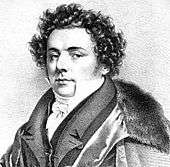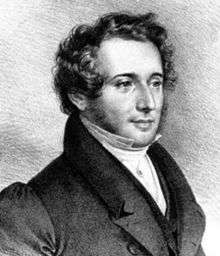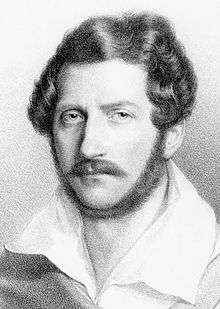Marino Faliero (opera)
Marino Faliero (or Marin Faliero) is a tragedia lirica, or tragic opera, in three acts by Gaetano Donizetti. Giovanni Emanuele Bidéra wrote the Italian libretto, with revisions by Agostino Ruffini, after Casimir Delavigne's play. It is inspired by Lord Byron's drama Marino Faliero (1820) and based on the life of Marino Faliero (c.1285-1355), the Venetian Doge.[1]
Rossini had influenced the management of the Théâtre-Italien to commission works by the outstanding Italian composers of the day—Donizetti and Vincenzo Bellini. Both wrote operas for that house in Paris, Bellini's contribution being the hugely-successful I puritani. Donizetti's opera, which premiered on 12 March 1835 (a few months after I puritani) was not nearly as much of a success. However, it marked Donizetti's first opera to have its premiere in Paris.
Critical Views
Marino Faliero suffers from the critical cliché that it wasn't a success in its Paris début run. The other accepted 'problems' are: the soprano lacks primacy and an aria di sortita, the score is mediocre Donizetti, and its eventual historical eclipse proves its lack of intrinsic merit. Perhaps too many critics like Donizetti in a box, as if all his operas must operate in the same way, as if all must compete with Lucia. Marino stresses a baritone, as does later Verdi. Donizetti creates four characters in dramatic equilibrium, as in the plot of Il Trovatore; curiously, writers have accorded Leonora---despite lacking Lucia-like preeminence---an acceptance denied Elena. Marino presented Paris with a score very different from I puritani; these different responses need not be taken as measures of the respective scores' worth as such. While I puritani intoxicates the ear with tonal bouquets, Donizetti's opera is the more difficult work in the best sense, a direct progenitor of Verdi and later opera. One remembers that Violetta's Amami, Alfredo is a direct Donizetti quote.
The Paris Premiere---Paris critics at the time of the premiere evinced much admiration. The famous illustrated Paris magazine Le Charivari reported on March 15, 1835: "In sum, Marino Faliero is a beautiful and grand success equal to that of the Puritans by Bellini." Revue du théâtre wrote: "On Thursday Marino Faliero was applauded as it merited, which is to say a great deal, for it is a very remarkable work." L'avant-scène wrote with Puritani-like enthusiasm: "There is no praise precise enough to characterize the feeling that Mademoiselle Grisi causes one to experience in this work: it is beyond marvel, beyond enchantment; there is truly something supernatural and magical in the voice and the spirit of this Diva."
The legendary impresario Alessandro Lanari wrote excitedly from Florence to Donizetti about the first Italian production, at the Teatro Alfieri, 1836: “Furore! Fanatismo! Entusiasmo! Your Marino Faliero was judged to be your masterpiece”.
Performance history
Marino Faliero was presented in London at Covent Garden on 14 May 1835[2] and at the Teatro Alfieri in Florence in 1836. Its first appearance in the US took place at the St. Charles Theater in New Orleans on 22 February 1842.[2] However, after several prohibitions from September 1839 onward, the opera was not presented until 3 September 1848, the day to which Black notes was the one on which the composer died in Bergamo.[3] After three complete performances, it disappeared from the repertory.[3]
Roles


| Role | Voice type | Premiere Cast, 12 March 1835 (Conductor: - ) |
|---|---|---|
| Marin Faliero, the Doge of Venice | bass | Luigi Lablache |
| Israele Bertucci, chief of the Venetian Arsenal | baritone | Antonio Tamburini |
| Fernando, Faliero's friend and in love with Elena | tenor | Giovanni Battista Rubini |
| Steno, member of the Council of Forty | bass | Vincenzo Felice Santini |
| Leoni, Member of the Council of Ten | tenor | |
| Elena, The Doge's wife | soprano | Giulia Grisi |
| Irene, Elena's servant | soprano | |
| Vincenzo, the Doge's servant | tenor | Enrico Tamberlik |
| Beltrame, a sculptor | bass | |
| Pietro, a gondolier | bass | Nicolay Ivanov |
| Guido, a fisherman | bass | |
| Gentlemen, knights, craftsmen, fishermen, servants, soldiers | ||
Synopsis
- Place: Venice
- Time: 1355
Elena, the wife of Marin Faliero, Doge of Venice, is continually subjected to attacks on her reputation by the patrician Steno whose advances she has rejected. Steno then insults Israele Bertucci, the chief of the Venetian Arsenal in front of his workers. Steno is punished for these offenses, but Faliero is infuriated by the leniency of the punishment. Israele convinces Faliero to join a conspiracy against the Council of Forty, of which Steno is a member.
Meanwhile, Elena is in love with Faliero's friend Fernando, who wants to leave the city to save her from dishonour. During a masked ball, Fernando challenges Steno to a duel for having insulted Elena once again. When Fernando is found dying in the place where the conspirators were to meet, Faliero vows to avenge his death.
The conspiracy collapses following a betrayal by one of its members and the Doge is condemned to death. Before his execution, Elena confesses her love affair with Fernando to him. Faliero begins to curse her, but sensing that his death is imminent, pardons her instead. Faliero is led off. Alone on the stage, Elena hears the sound of the executioner's axe, screams and faints.[4]
Recordings
| Year | Cast: Marino Faliero, Israele Bertucci, Fernando, Elena |
Conductor, Opera House and Orchestra |
Label[5] |
|---|---|---|---|
| 1976 | Cesare Siepi, Licinio Montefusco, Giuliano Ciannella, Marisa Galvany |
Elio Boncompagni, RAI Milan Symphony Orchestra |
Audio CD: Bongiovanni Cat: 2408/9-2;[6] Myto Records Cat: MCD 054.314 |
| 2002 | Michele Pertusi, Roberto Servile, Rockwell Blake, Mariella Devia |
Ottavio Dantone, Orchestra and Chorus of Teatro Regio Parma (Recording of a performance in Parma, 2 January) |
Audio CD: House of Opera Cat: CD 820 |
| 2008 | Giorgio Surian, Luca Grassi, Ivan Magri, Rachele Stanisci |
Bruno Cinquegrani, Orchestra and Chorus of Bergamo Musica Festival Gaetano Donizetti, (Filmed at the Teatro Donizetti, Bergamo, 31 October and 2 November) |
DVD: Naxos, Cat: VD 2.110616-17. |
References
Notes
- ↑ Casaglia, Gherardo (2005).[http://www.amadeusonline.net/almanacco?r=&alm_giorno=12&alm_mese=03&alm_anno=1835&alm_testo=Marino_Faliero "Marino Faliero, 12 March 1835"]. Almanacco Amadeus (Italian).
- 1 2 Ashbrook and Hibberd 2001, p. 237
- 1 2 Black 1982, pp. 33—34.
- ↑ Part of this synopsis is a translation from Marin Faliero (opera) on the Italian Wikipedia.
- ↑ Recordings of Marino Faliero on operadis-opera-discography.org.uk
- ↑ Tom Kaufman, "Marino Faliero", Opera Today online, 31 May 2006
Cited sources
- Ashbrook, William; Sarah Hibberd (2001), in Holden, Amanda (Ed.), The New Penguin Opera Guide, New York: Penguin Putnam. ISBN 0-14-029312-4.
- Black, John (1982), Donizetti’s Operas in Naples, 1822—1848. London: The Donizetti Society.
Other sources
- Allitt, John Stewart (1991), Donizetti: in the light of Romanticism and the teaching of Johann Simon Mayr, Shaftesbury: Element Books, Ltd (UK); Rockport, MA: Element, Inc.(USA)
- Ashbrook, William (1982), Donizetti and His Operas, Cambridge University Press. ISBN 0-521-23526-X
- Ashbrook, William (1998), "Marino Falliero" in Stanley Sadie (Ed.), The New Grove Dictionary of Opera, Vol. Three, p. 218. London: MacMillan Publishers, Inc. ISBN 0-333-73432-7 ISBN 1-56159-228-5
- Loewenberg, Alfred (1970). Annals of Opera, 1597-1940, 2nd edition. Rowman and Littlefield
- Osborne, Charles, (1994), The Bel Canto Operas of Rossini, Donizetti, and Bellini, Portland, Oregon: Amadeus Press. ISBN 0-931340-71-3
- Sadie, Stanley, (Ed.); John Tyrell (Exec. Ed.) (2004), The New Grove Dictionary of Music and Musicians. 2nd edition. London: Macmillan. ISBN 978-0-19-517067-2 (hardcover). ISBN 0-19-517067-9 OCLC 419285866 (eBook).
- Weinstock, Herbert (1963), Donizetti and the World of Opera in Italy, Paris, and Vienna in the First Half of the Nineteenth Century, New York: Pantheon Books. LCCN 63-13703
External links
- Donizetti Society (London) website
- Libretto (Italian)
- Marino Faliero by Lord Byron (1821) full play text with commentary
